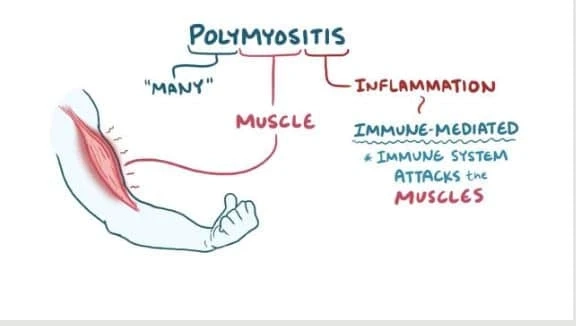What is Polymyositis?
Polymyositis is also known as inflammatory myopathy is an unusual inflammatory disease that causes muscle weakness affecting both sides of your body. Having this condition could make it difficult to climb stairs, rise from a seated position, lift objects or reach overhead.
Polymyositis most frequently affects adults in their 30s, 40s, or 50s. It is more common in blacks than in whites, and women are affected more usually than men. Signs and symptoms usually develop slowly, over weeks or months.
While there is no cure for polymyositis, treatment — ranging from medications to physical therapy — could improve your muscle strength and function.
Polymyositis Symptoms
The muscle weakness related to polymyositis involves the muscles closest to the trunk, like those in your hips, thighs, shoulders, upper arms, and neck. The weakness affects both the left and right sides of your body and tends to slowly get worse.
When should you see a doctor?
Look for medical attention if you develop unexplained muscle weakness.
Polymyositis Causes
The exact cause of polymyositis is not known, but the disease shares many characteristics with autoimmune disorders, in which your immune system mistakenly attacks your own body tissues.
Polymyositis Risk factors
Your risk of polymyositis is greater if you have lupus, rheumatoid arthritis, scleroderma, or Sjogren's syndrome.
Polymyositis Complications
Potential complications of polymyositis include:
Difficulty swallowing - If the muscles in your esophagus are affected, you might have problems swallowing (dysphagia), which in turn might cause weight loss and malnutrition. Aspiration pneumonia - Difficulty swallowing might also cause you to breathe food or liquids, including saliva, into your lungs (aspiration), which could lead to pneumonia. Breathing problems - If your chest muscles are affected by the disease, you might experience breathing problems, like shortness of breath or, in severe cases, respiratory failure.Associated conditions
However, these are not complications, polymyositis is usually related to other conditions that might cause further complications of their own, or in combination with polymyositis symptoms. Related conditions include:
Raynaud's phenomenon - This is a condition where your fingers, toes, cheeks, nose, and ears initially turn pale when exposed to cold temperatures. Other connective tissue diseases - Other conditions, like lupus, rheumatoid arthritis, scleroderma, and Sjogren's syndrome, could happen in combination with polymyositis. Cardiovascular disease - Polymyositis might cause the muscular walls of your heart to become swollen (myocarditis). In a small number of people with polymyositis, congestive heart failure and heart arrhythmias might develop. Lung disease - A condition known as interstitial lung disease might happen with polymyositis. Interstitial lung disease means a group of disorders that cause scarring (fibrosis) of lung tissue, making lungs stiff and inelastic. Signs and symptoms involve a dry cough and shortness of breath. Cancer - People who have polymyositis have an increased risk of cancer.Continue to Read More Click Here


